(New York Jewish Week) — “My feelings about Israel are the reasonable ones,” says Asaf Sternheim, an adjunct writing professor at an unnamed university who is the protagonist in a buzzy new play opening in New York this week.
Speaking to his wife, Asaf — played by Jewish actor and “How I Met Your Mother” star Josh Radnor — elaborates on his feelings about Israel: “That there were strong arguments for creating it, so it’s maybe good that it exists — but that I don’t like a lot of things it actually does.”
Such ambivalence is at the core of Radnor’s character in “The Ally,” a timely drama that opens at The Public Theater on Tuesday. Throughout the nearly two-and-a-half-hour play, the audience watches Asaf get increasingly embroiled in conflict after he signs a letter that tangentially criticizes Israel. The show’s themes seem ripped from the headlines: the Israeli-Palestinian conflict, campus activism, racism and antisemitism, to name a few.
The play “will evoke strong and contradictory opinions in an audience,” Oskar Eustis, the artistic director of the Public Theater, wrote in a note published in Playbill, adding that the goal of works like “The Ally” is to allow viewers “to get some distance from our own position, empathize with the feelings of others, and break the habits of thought and belief that keep us at each other’s throats in the world outside the theater.”
Written by Itamar Moses (who won a Tony for “The Band’s Visit,” another show about Israel) and directed by Lila Neugebauer, the play centers on Asaf — who, like Moses, is a 40-something playwright who grew up in Berkeley, California, the son of Israeli parents. The professor finds himself thrust into the center of a campus conflict when he’s asked by a former student, Baron, to sign a manifesto protesting the killing of his cousin, who is Black, by the local police. Asaf signs on to the manifesto — “I’ll be one name among hundreds; maybe thousands,” he tells himself — despite it calling Israel an apartheid state.
Asaf becomes known on campus as a signatory, which leads two students to ask him to be a faculty sponsor for a new group that wants to host a critic of Israel. Things quickly spiral from there: Asaf falls into an “increasingly complex web of conflicting agendas that challenge his allegiances as a progressive, a husband, an artist, an academic, an American, an atheist, and a Jew,” according to a press release.
Though written well in advance of the fall of 2023, “The Ally” arrives in a New York City that’s been roiled to its core by the Oct. 7 terror attack in Israel and the ensuing deadly war between Israel and Hamas. Since the war began nearly five months ago, antisemitic incidents in the city have increased, while pro-Palestinian street demonstrations have occurred on an almost-daily basis. The city’s campuses — from Columbia to NYU to CUNY — have especially been hotspots of activism. As heated debates over the war have continued, students have been assaulted, disciplined and had their groups banned.
Just how theatergoing New Yorkers will react to a play about such incendiary and timely topics remains to be seen. As the drama unfolds, the audience meets a variety of characters, from Nakia, an African-American lawyer-turned-community organizer — who also happens to be Asaf’s ex-girlfriend — to Reuven, a black kippah-wearing pro-Israel graduate student. They address and debate myriad issues, including the meanings of the phrase “Never Again” and what, exactly, constitutes genocide. Much of the dialogue mirrors the debates currently taking place on campuses, in synagogues and at dining room tables across the city and beyond.
Moses, the playwright, told the New York Times that one of the “trickiest questions” he asks in the play is “whether the fight against antisemitism belongs as a coequal branch of the social justice movement.”
Ultimately, the play does not deliver clear answers. Audiences are asked to sit with the discomfort of the characters’ competing views.
“I’m not interested in saying someone’s completely right or completely wrong, or someone’s a hero or a villain,” Moses told the Times. “I don’t think it’s true. I want them all to be seductive and have their flaws.”
“The Ally” opens at The Public Theater (425 Lafayette St.) on Tuesday and runs through March 17. Click here for tickets and information.
Support the New York Jewish Week
Our nonprofit newsroom depends on readers like you. Make a donation now to support independent Jewish journalism in New York.




